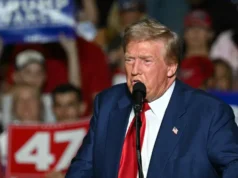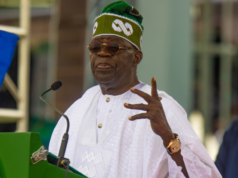Donald Trump’s proposed actions for his first day back in office reveal a sweeping and controversial agenda, centered on mass deportations, rolling back Biden-era policies, and pardoning those involved in the January 6, 2021, Capitol riot.
The president elect, aims to implement drastic measures immediately upon taking office.
Trump has made it clear that his first day would be an ambitious one, stating that he would act “like a dictator, except for Day 1.”
His plans include starting the deportation of migrants who entered the country illegally, reversing many of the Biden administration’s policies on immigration, and firing thousands of federal employees he believes are part of a “deep state” conspiracy against him.
A major part of his first-day agenda involves granting pardons to individuals convicted of crimes related to the January 6 attack on the U.S. Capitol.
Trump has repeatedly expressed admiration for those involved in the violent insurrection, calling them “unbelievable patriots.”
In fact, he has promised to pardon over 1,500 individuals who participated in the riot, despite criticism that such actions would send a dangerous message about accountability for violent extremism.
Trump’s statements on immigration are equally firm.
He reiterated his intent to “close the border” and reinstate his “drill, drill, drill” policy for energy production, a stance he’s emphasized throughout his campaign.
These moves would echo the aggressive immigration policies he pursued during his first term, which included building a border wall and enacting strict deportation measures.
While Trump has stated that he would immediately seek to fire Special Counsel Jack Smith, who is leading federal investigations into his actions surrounding the 2020 election and classified documents, his options are more constrained when it comes to his state conviction in New York.
Since presidential pardons only apply to federal crimes, Trump would not be able to pardon himself for state-level charges, though he might explore other avenues to avoid prison time.
The former president’s promise to issue pardons for those involved in the January 6th Capitol attack has raised alarms among legal experts and critics, who argue that such actions would further undermine the rule of law.
Trump’s characterization of the January 6 rioters as patriots stands in stark contrast to the assessments of many judges and prosecutors, who have condemned the violent assault on the Capitol as a direct attack on the democratic process.
Trump’s first-day plans are likely to ignite fierce debate on the role of the presidency, executive power, and accountability in the aftermath of the Capitol insurrection.

















